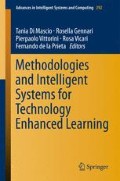Abstract
Opensource software can provide a wide range of educational computer games and gaming tools so to enable a sharing community among teachers. Since their appearance Metaverses appealed the technology prone teachers, increasing the number of virtual worlds learning projects. The Open Source movement create an ecosystem of software, documentation and tools that it makes easier for teachers to share their work and learning objects. Here we show how an open source Metaverses becomes a tool for the teaching of science subjects in a Department of Human Studies, where students can learn the basics of a simplified von Neumann-class computer architecture in a OpenSimulator virtual learning environment. A survey among students showed that interacting with a virtual computer architecture in a immersive 3D environment increased their learning achievements and subject comprehension.
Access this chapter
Tax calculation will be finalised at checkout
Purchases are for personal use only
Preview
Unable to display preview. Download preview PDF.
References
Bainbridge, W.S.: The Scientific research Potential of Virtual Worlds. Science 317(5837), 472–476 (2007)
Callaghan, M.J., McCusker, K., Losada, J.L., Harkin, J.G., Wilson, S.: Teaching Engineering Education Using Virtual Worlds and Virtual Learning Environments. In: International Conference on Advances in Computing, Control, and Telecommunication Technologies (ACT 2009), pp. 295–299 (2009)
De Gasperis, G., Salvi, A.: Uso e strumenti basati su Metaversi 3D per l’insegnamento dell’Informatica e dei Sistemi di Elaborazione delle Informazioni. In: Proceeding of DIDAMATICA 2009 (2009)
De Gasperis, G., Di Maio, L., Di Mascio, T., Florio, N.: Il metaverso Open Source: Strumento didattico per facoltà umanistiche. In: Proceedings of DIDAMATICA 2011 (2011)
Getchell, K., Miller, A., Nicoll, R., Sweetman, R., Allison, C.: Games Methodologies and Immersive Environments for Virtual Fieldwork. IEEE Transactions on Learning Technologies 3(4), 281–293 (2010)
Gorrino, A., De Gasperis, G.: Virtual laboratory for the training of health workers in italy. In: Omatu, S., Paz Santana, J.F., González, S.R., Molina, J.M., Bernardos, A.M., Rodríguez, J.M.C. (eds.) Distributed Computing and Artificial Intelligence. AISC, vol. 151, pp. 41–48. Springer, Heidelberg (2012)
Girvan, C., Savage, T.: Identifying an appropriate pedagogy for virtual worlds: A Communal Constructivism case study. Computers & Education 55, 342–349 (2010)
Jiang, X., Liu, C., Chen, L.: Implementation of a project-based 3D virtual learning environment for English language learning. In: 2nd International Conference on Education Technology and Computer (ICETC), vol. 3, pp. 281–284 (2010)
Jong, M.S., Lee, J.H., Shang, J.: Educational Use of Computer Games: Where We Are, and What’s Next. In: Reshaping Learning, pp. 299–320. Springer, Heidelberg (2013)
Kuo, M.S., Lin, C.S.: Virtual Parabola Festival: The Platform Design and Learning Strategies for Virtual Learning Community of Practice. In: 3rd IEEE International Conference on Digital Game and Intelligent Toy Enhanced Learning (DIGITEL), pp. 3–9 (2010)
Leman, F.G., Gu, N., Williams, A.: Virtual worlds as a constructivist learning platform: evaluations of 3D virtual worlds on design teaching and learning. ITcon. Special Issue Virtual and Augmented Reality in Design and Construction 13, 578–593 (2008), http://www.itcon.org/2008/36
Liu, M., Moore, Z., Graham, L., Lee, S.: A look at the research on the computer-based technology use in second language learning: a review of the literature from 1990-2000. Journal of Research on Technology in Education 34(3) (2002)
Morganti, F., Riva, G.: Conoscenza, comunicazione e tecnologia. LED Edizioni Universitarie, Italy (2006)
Morningstar, C., Farmer, F.R.: The Lessons of Lucasfilm’s Habitat. Paper presented at the 1st International Conference on Cyberspace at the University of Texas, Austin (1991)
Von Neumann Architecture, Wikipedia, http://en.wikipedia.org/wiki/Von_Neumann_architecture (accessed September 9, 2013)
Stephenson, N.: Snow crash. Bantam Books (2000)
Wei, C.S., Chen, Y., Doong, J.G.: A 3D Virtual World Teaching and Learning Platform for Computer Science Courses in Second Life. In: International Conference on Computational Intelligence and Software Engineering (CiSE 2009), pp. 1–4 (2009)
Zhao, H., Sun, B., Wu, H., Hu, X.: Study on building a 3D interactive virtual learning environment based on OpenSim platform. In: International Conference on Audio Language and Image Processing, pp. 1407–1411 (2010)
Zhou, Z., Jin, X.L., Vogel, D., Guo, X., Chen, X.: Individual Motivations for Using Social Virtual Worlds: An Exploratory Investigation in Second Life. In: 43rd Hawaii International Conference on System Sciences, pp. 1–10 (2010)
Author information
Authors and Affiliations
Corresponding author
Editor information
Editors and Affiliations
Rights and permissions
Copyright information
© 2014 Springer International Publishing Switzerland
About this paper
Cite this paper
De Gasperis, G., Florio, N. (2014). Opensource Gamification of a Computer Science Lecture to Humanities Students. In: Mascio, T., Gennari, R., Vitorini, P., Vicari, R., de la Prieta, F. (eds) Methodologies and Intelligent Systems for Technology Enhanced Learning. Advances in Intelligent Systems and Computing, vol 292. Springer, Cham. https://doi.org/10.1007/978-3-319-07698-0_15
Download citation
DOI: https://doi.org/10.1007/978-3-319-07698-0_15
Publisher Name: Springer, Cham
Print ISBN: 978-3-319-07697-3
Online ISBN: 978-3-319-07698-0
eBook Packages: EngineeringEngineering (R0)

